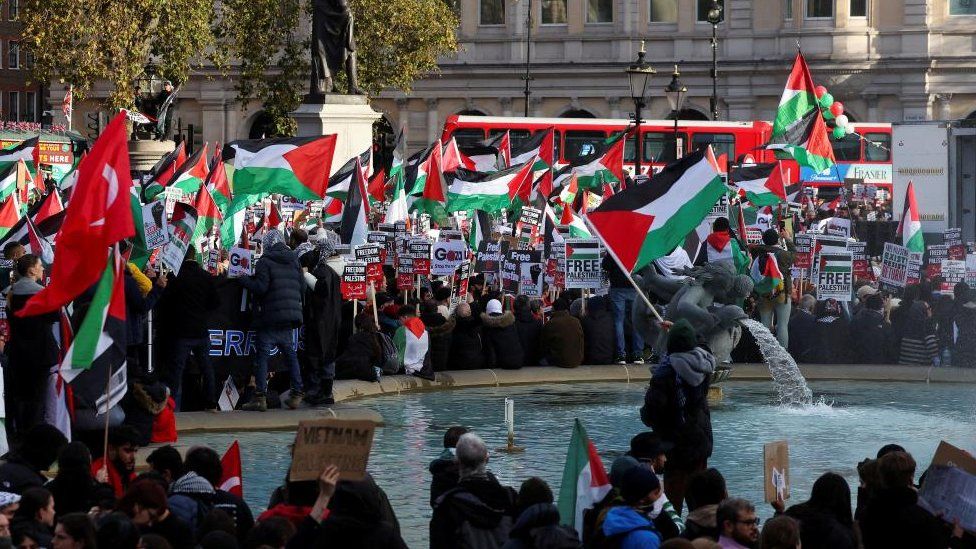10 hours ago
About sharing
A pro-Palestinian march due to take place on Armistice Day would only be banned as a “last resort”, the Metropolitan Police Commissioner said.
Sir Mark Rowley vowed officers would do all they could to protect remembrance activities and Jewish communities.
While he said police could not ban static protests under UK law, they can request the power to stop a march if a threat of serious disorder emerges.
But he said the “very high” threshold had not yet been reached.
Sir Mark added that use of the power was “incredibly rare” and there must be no other way for police to manage the event.
On Monday, the force publicly urged organisers to postpone the event, which is due to take place in central London, saying it would not be “appropriate”.
Both Prime Minister Rishi Sunak and Home Secretary Suella Braverman have criticised the timing of the march on 11 November, which thousands are expected to attend.
A Remembrance event is due to take place at the Royal Albert Hall the same day, as well as a national two minute’s silence.
But organisers have refused to postpone despite public pressure from police and politicians, pointing out the planned route does not go past the Cenotaph war memorial and the march is due to start after the two minute’s silence.
Speaking to the BBC, the Met chief said: “At the moment, the organisers are still putting the final stages to their plans – which, to be fair to them, are some way away from the ceremonial footprint in Whitehall.
“They’re putting the final touches to those, we’re looking alongside that at what conditions we might need to do to reinforce the protection of critical events and of Jewish communities and the like.
“If over the next few days the intelligence evolves further and we get to such a high threshold – and it’s only been done once in a decade where we need to say to the home secretary ‘we think we need to ban the march element’ – then of course we will do.
“But that’s a last resort that we haven’t reached yet. People should be very reassured that we are going to keep this all away from the remembrance and Armistice events.”
He added: “There will be a protest this weekend – the law provides no mechanism to ban a gathering, a static protest, a rally, anything like that… if the organisers want that, then it will happen.”
While there have been arrests on previous protests – including for serious offences – the Met chief told the BBC he would not class the scale as “major disorder”.
But Sir Mark said he was concerned about the escalating risk of disorder caused by splinter groups breaking off from the main demonstration, saying the threat posed by them would be monitored this week.
He said the force was “never afraid to use the law to its full effect” but suggested banning the march at a late stage could create problems for police.
He continued: “If you’ve got tens of thousands of people coming from across the country, and they know their absolute right to protest means the gathering itself can’t be banned, the chaos that comes into this because of last-minute changes in plans and those issues can make it more difficult.”
He said if the Met “comes to the view that our existing tactics and control measures” aren’t sufficient, then the force “will go to the Home Secretary, but not before that point”.
Suella Braverman has been highly critical of the large pro-Palestinian protests which have taken place in London in the last month.
Sir Mark declined to criticise her for dubbing them “hate marches”, but added: “I wouldn’t use one phrase to characterise 100,000 people”.
Sign up for our morning newsletter and get BBC News in your inbox.
Related Topics
3 days ago
29 October
1 day ago
